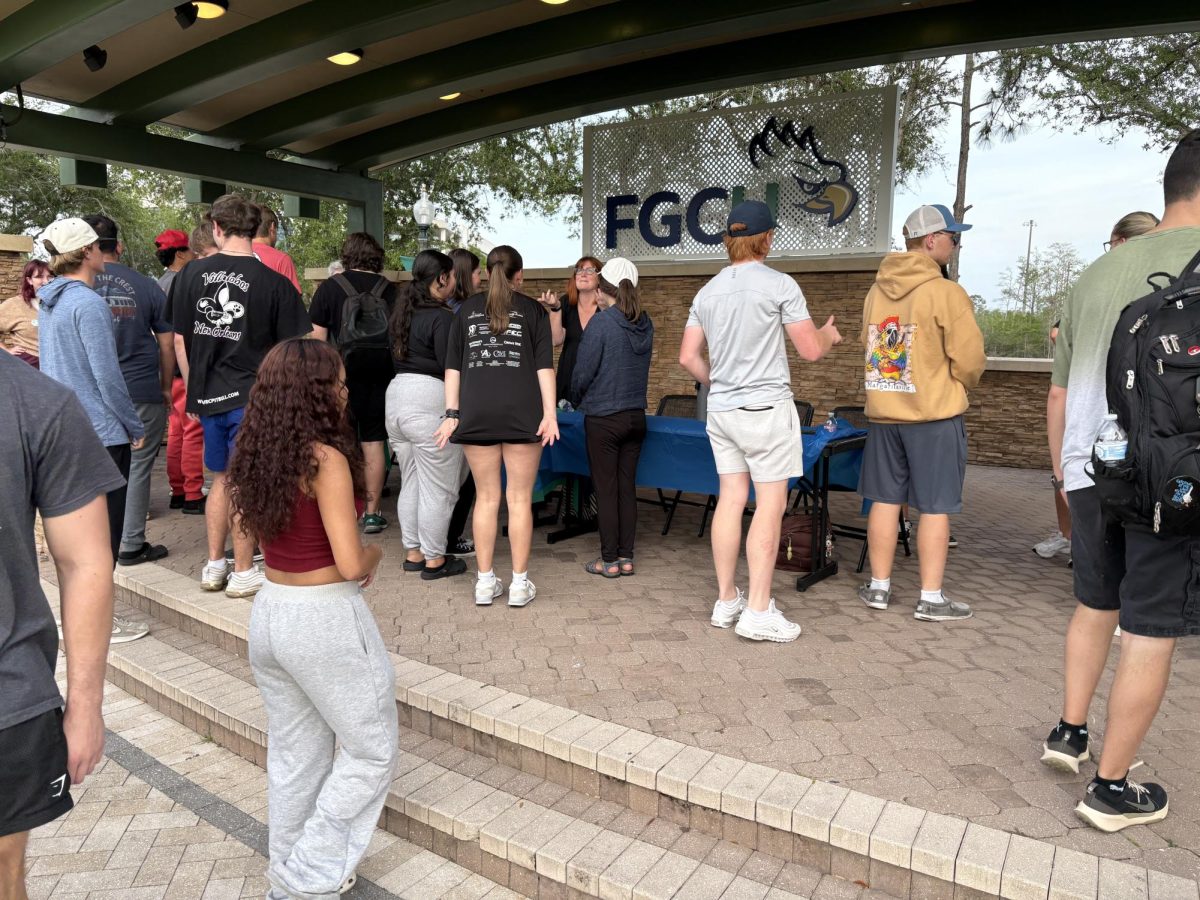Micah Armstrong paces nervously back and forth in the courtyard.
Beneath the January sun, beads of sweat collect on the face of the traveling preacher. Clutching his Bible and a gallon of water in his right hand; Armstrong continues his anti-gay rant.
A growing crowd of 75 Florida Gulf Coast University students forms a semi-circle around him.
Tensions are mounting.
“You’re going to go to the same hell as Hitler,” Armstrong yells, thrusting his index finger into Julian Montalvo’s face. The FGCU student doesn’t back down. Wearing a gay-pride flag as a cape and holding a sign that reads, “Please excuse the ignorance,” Montalvo defends himself.
This display was typical of the antics that ensue when Armstrong, known as the sobriquet “Brother Micah,” demonstrates on a college campus.
On that day in the courtyard, the students weren’t wrong. But neither was Armstrong. Both parties were exercising their First Amendment rights at FGCU.
Free Speech Myth Students are often under the impression FGCU has a free-speech zone, located on the library lawn. Susan Evans, FGCU’s vice president and chief of staff, refutes that myth. Evans and Vice President of Student Affairs Mike Rollo say all of FGCU is a free-speech zone.
“Most campuses have a place that people gravitate to,” Rollo said. “Everybody at some pointgoes through (the library lawn). It’s just where the people are andyou go where the people are.”
Unaffiliated groups are allowed to demonstrate at FGCU since it is a public university. But they have some restrictions. They must make a request to showcase their causes.
Last year, four unaffiliated groups, Reform America, Lifeline Family Center, The Canadian Center for Bio-Ethical Reform and Created Equal (who will return to FGCU this March) made requests to demonstrate at FGCU.
These groups are all pro-life organizations. Each association explains on the campus reservation form that during their time on campus they will display graphic images of fetuses before and after an abortion.
However graphic the images might be, this display is still in compliance with University policy.
“As a public university, FGCU strongly encourages free speech
and the free exchange of ideas in a collegial, safe and civil manner that respects the University’s normal operation for education and campus life,” Evans said.
Many demonstrators on campus use amplified sound. For instance, many fraternities and sororities use amplified sound to play music when they setup tables around campus. Just like Greek Life, unaffiliated groups are also entitled to project what they are saying.
In situations where the amplified sound is too loud, the University will step in to assess the noise level and has the right to require the party to lower or cease the amplified sound. Rollo explained FGCU has no problem stepping in if a demonstrator becomes too loud.
“If they get to be so loud it interferes with offices functioning
or people doing their work, we’ll ask them to turn it down, and if necessary, to turn it off and if necessary, to leave. But people are usually cooperative,” he said.
Candidates for the Student Government elections converged on the lawn this week to spout their campaign messages. However, the rules are different for inside campus buildings, according to FGCU
FGCU’s Buildings: Off Limits
Earlier this week, 40 Florida Atlantic University students gathered in front of the office of the school’s president, Mary Jane Saunders, to protest a $6 million dollar donation from GEO Group. The school would name its football stadium after the private prison corporation.
This would not be tolerated at FGCU.
“The University’s ‘Public Expression and Assembly Regulations’ prohibits demonstrations inside buildings,” Evans said.
Evans explains this point using President Wilson Bradshaw’s office as an example. She says if a student wants to protest Bradshaw’s office, they are allowed to protest outside the building but not immediately outside the president’s office.
While the school is allowed to regulate demonstrations inside buildings, it isn’t always the solution to maintaining the peace. Talbot “Sandy” D’Alemberte, former president of the American Bar Association and current professor of law at Florida State University, explains how this can sometimes backfire for a school.
“(Including free speech inside campus buildings) is the common sense thing to do,” D’Alemberte said. “Restrictions typically cause people to get angry and cause more problems than if they allowed the speech in the first place.”
D’Alemberte goes on to say that a school can restrict a rally ordemonstration if it disrupts the flow of procedure.
Some students find their first encounter with controversial speakers can be jarring.
The Learning Curve In regard to freedom of speech, the transition from high school to college can sometimes be shocking for students.
Students, such as Montalvo, may not fully grasp the concept of a public forum when they first arrive at a university. Montalvo believes the campus should control the speakers and content once they are on FGCU property.
“They do have the right (to free speech), but those rights should be changed when it comes to the context of the situation. Speaking on a college campus is different than speaking on a sidewalk,” Montalvo said. “(Armstrong) uses racial slurs and hate speech. I don’t think it should be tolerated on campus.”
High schools are also state regulated institutions with different rules than university campuses.
Protestors and demonstrators are not permitted and therefore would be arrested for trespassing should they try to come onto that type of campus.
According to Florida Statue 810.011, “During the period from 1 hour prior to the start of a school session until 1 hour after the conclusion of a school session, it is unlawful for any person to enter the premises or trespass within a school safety zone.”
This shift from private property to public campus is not always easy to grasp.
“We’re all citizens of the United States. The U.S. Constitution says we have freedom of speech. We are different than the street corners. We are a limited public forum,” Rollo said. “We don’t have absolute freedom to go everywhere on this campus. You can’t stand up in a classroom and disrupt the classroom. But we are state property. And as long as it’s not disruptive you can stand out there and say anything.”
This debate isn’t just a college conversation. The First Amendment has also a resurgent issue in the Supreme Court. And it’s the Supreme Court that ultimately defines the First Amendment and free speech. Defining the First Amendment.
In 2010, Albert Snyder sued Fred Phelps of the Westboro Baptist Church for protesting the funeral of his son, Marine Lance Corporal Matthew Snyder.
The case was brought before the Supreme Court, and in an 8-1 decision the justices sided with Phelps.
Although the Westboro Baptist Church is notorious for its vicious slogans, such as “Thank God For Dead Soldiers,” they did not disturb the funeral and therefore are entitled to peaceful protest.
This trial mirrored, almost identically, Montalvo’s plight against Armstrong.
The Associated Press made a statement siding with Phelps. The statement explained that should the First Amendment be tampered with, the U.S. Constitution we know today may be gone by tomorrow.
In cases like Snyder v. Phelps the determining factor is often if the protest, speech or press is within the context of public concern.
To ensure American freedoms are protected, the definition of “public concern” is extremely broad. The Snyder v. Phelps lawsuit describes public concern as speech that is “fairly considered as relating to any matter of political, social or other concerns of the community.”
The Armstrong Tours Florida campuses have experienced Armstrong’s “tours” for years. For better or worse, he has become a college sensation as he and his wife, “Sister Elizabeth” Armstrong, travel from campus to campus.
“My brother had to deal with (Brother Micah) when he went to University of Florida 10 years ago,” said University of Central Florida junior and Secular Student Alliance at UCF member, Carolina Zelaya.
Armstrong leaves no public university untouched.
“I attended FAU my first two years. He was there pretty frequently,” Mac Scott, a FGCU journalism major said. “(Armstrong is) very enigmatic. He would be there and then he’d be gone. No one sees him show up and no one sees him leave.”
While the Armstrongs most regularly attend a church in Tampa, the open road is their home. Driving from school to school in their camper, they continue their tours of the southeastern states thanks to churches and supporters who fund their cause, according to the Associated Press.
Even though his presence is often unexpected, the affront the student body feels is not. Students like Montalvo have made their point known.
“Once it becomes a nuisance, cut it off,” Montalvo said. “Students are coming here to learn, not to be condemned.”
However the right that allows Montalvo to express his feelings about Armstrong is the same right Armstrong has to go wherever he pleases and say whatever he likes.
Speak Your Mind, But Be Cautious:
Results May Vary Everyone has the right to speak their mind at FGCU, but that doesn’t mean people won’t get angry. Last December an enraged student spit on a preacher in the courtyard, according to UPD. The preacher did not press charges against the student.
Armstrong and Montalvo have also butted heads to the point of near-physical confrontation.
“There was a conflict between me and Brother Micah,” Montalvo said. “He started talking about my mother, calling her fat. Then he got in my face and started poking me. Two students had to get in between us because if it had gone further there would have been a physical confrontation.”
When pitted against one student, Armstrong is fearless but he becomes intimidated when swarmed by groups of students.
That January day in the courtyard was no exception.
When the crowd grows to 100 students, Armstrong stops preaching and decides to call university police.
He fears for his safety.
He tells dispatch he is scared of the crowd.
UPD denies his request for an officer.
The much-talked-about minister is silenced. He scurries for refuge in Student Financial Services in McTarnagan Hall.
As long as there continues to be a First Amendment, Armstrongwill have the right to continue his relentless antics and the students will have the right to challenge him with peaceful assembly.
“We have to be tolerant of people who say things we don’t want to hear,” Rollo said. “It’s not against the law to be a jerk.”


























